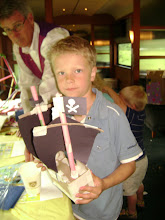When I realized that Genesis was not only non-literal, that humans arose from a Primate ancestor as a population, not an individual couple, I suspected we were missing what Genesis 1 -11 was getting at. Then, I learned/remembered the Ancient Near Eastern myths paralleled Genesis 2 - 11. Now, I want to ponder some possible readings of Genesis, the ancients saw in it.
The first is in Genesis 1:26
Then God said, "Let us make mankind in our image, in our likeness, so that they may rule over the fish in the sea and the birds in the sky, over the livestock and all the wild animals, and over all the creatures that move along the ground."
Western reading:
Ancient reading:
The first is in Genesis 1:26
Then God said, "Let us make mankind in our image, in our likeness, so that they may rule over the fish in the sea and the birds in the sky, over the livestock and all the wild animals, and over all the creatures that move along the ground."
Western reading:
- A descriptive way of saying we are the top of the food chain, the brightest of all creatures, found in all continents sustaining year-round life. We are God's main purpose.
Ancient reading:
- We are the image of God - idols in temples were the image of gods, not people, this is different!
- Rule over the creatures! Humans are slaves to the gods, we rule over nothing! Radical God, this is.
- This is every creature! What? Why wouldn't God rule the creatures? Why would he consider us worthy to rule any of them?!? He made the world for us!!! No, he made it for himself, didn't he???
Genesis 1:27
So God created mankind in his own image, in the image of God he created them; male and female he created them.
Western reading:
- We are the rulers, so we bear the image of God as a ruling, intelligent species. May, or may not deal with the fact both sexes are the image of God.
Ancient reading:
- All humans are made by one god? all humans, not males or females or people east or west of this or that river bear the image of one god? Where is this god's consort? Marduk has Ishtar, Baal has Ashera, Osiris has Neptalli (gods and goddesses have pairs - for fertility).
- Humans sit in the idol's spot in the temple God created (Earth, Sky, Heavens all combine to show a temple). The idol is an image, we sit in the idol's place, image bearer. We are the image of God?
Genesis 1: 28
God blessed them and said to them, "Be fruitful and increase in number; fill the earth and subdue it. Rule over the fish in the sea and the birds in the sky and over every living creature that moves on the ground."
Western reading:
- We should control the earth, take what we want (some say need).
- Some say children are always a blessing, don't use birth control, small families are selfish. Most just say Children are a blessing (any number). A growing number aren't into kids (child free).
Ancient reading:
- This doesn't sound right! Other gods view us as their slaves, now we are free.
- This God is an amazing provider, humans have found favour with Him. Fertility is the surest sign of God's blessing.
- He is giving us the things reserved for gods? We are blessed. What will he ask in return? Our first born? Our crops? Our spring lambs? This is a vastly different God.
- Does this God have the power to really give us all this? What about the other gods, will they get angry?
- The God a Abraham, Issac and Jacob is a very great and generous God.
Genesis 1: 29 - 30
Then God said, "I give you every seed-bearing plant on the face of the whole earth and every tree that has fruit with seed in it. They will be yours for food. And to all the beasts of the earth and all the birds in the sky and all he creatures that move along the ground - everything that has the breath of life in it - I give every green plant for food." And it was so.
Western reading:
- God is still telling his creation story - literal or not.
Ancient reading:
- God is the overarching creator. He made the earth with a purpose. Humans need to honour this purpose, giving him a place - temple - to thank him for this provision and freeing us from having to worship/appease/thank so many other gods.
There is much more, I am sure. I would love to see the Bible creation of humans written about from an Ancient Near Eastern scholar, what does this story tell us about Creator, Creation, Creature?

No comments:
Post a Comment